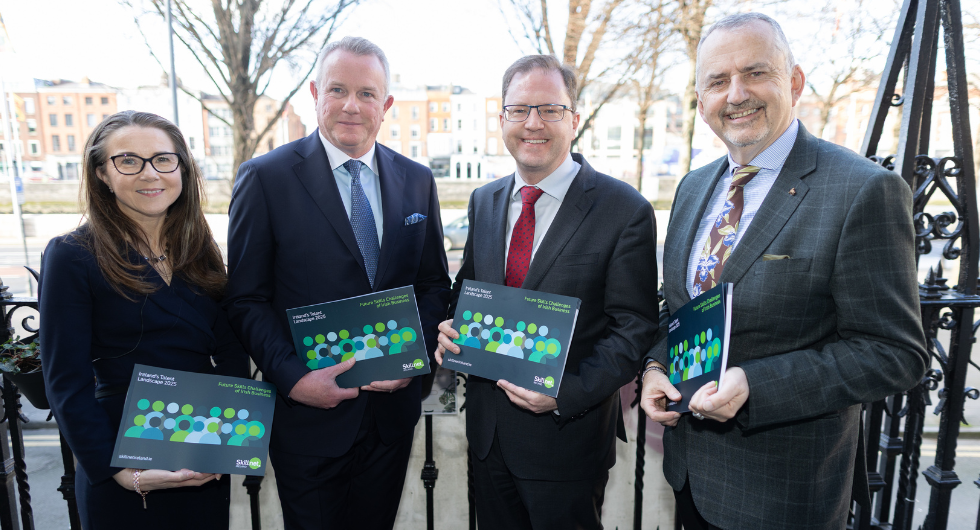Minister for Further and Higher Education, Research, Innovation and Science, James Lawless TD, has announced a new research study from Skillnet Ireland, reporting that two-thirds of businesses recognise upskilling as a strategically important priority in fostering innovation and enabling competitiveness.
The report, entitled Ireland’s Talent Landscape 2025: Future Skills Challenges of Irish Business and authored by Ipsos B&A, has built on the inaugural Ireland’s Talent Landscape study of last year. The research identified the skills challenges facing businesses in adapting to the changing nature of work in the face of the digital, artificial intelligence (AI) and green transitions.
Speaking at the launch of the Ireland’s Talent Landscape 2025 report, Minister James Lawless said: “This new research from Skillnet Ireland provides invaluable insights into the skills and workforce challenges facing Irish businesses at this pivotal time. Ireland’s highly skilled workforce has long been the foundation of our economic success, and this study underscores the critical importance of continued investment in talent development to sustain our global competitiveness. The Government is committed to supporting Irish businesses in developing the future-ready skills needed to drive innovation, enhance productivity, and secure Ireland’s position as a global leader in talent and investment."
The report stresses the challenges of sourcing and retaining skilled talent. In an economy operating at historic employment levels, sourcing skills remains a challenge, with 42% of businesses struggling to find employees with essential skillsets. Almost 80% of businesses indicated their staff will require digital upskilling in the coming years to perform their roles, while two-thirds (66%) said they will need climate action and sustainability related upskilling.
Mark Jordan, CEO, Skillnet Ireland, said: “The Ireland’s Talent Landscape 2025 report offers a vital snapshot of both the skills challenges and opportunities facing Irish businesses as they navigate a rapidly evolving economic landscape. The research confirms what we at Skillnet Ireland see every day, that businesses understand that investment in talent is key to maintaining a competitive edge. Through our industry-led approach, and in collaboration with government, Skillnet Ireland is committed to playing a central role in delivering upskilling solutions that empower businesses to adapt and thrive.”
The study, which surveyed 500 businesses from across Ireland to assess the emerging trends in upskilling and talent development, found a growing consensus on the importance of AI, diverging levels of AI usage across sectors of the Irish economy, a strong awareness of the skills required to integrate AI successfully and the barriers businesses face as part of this process. The research found that while 54% of Irish companies are yet to use AI, 66% of respondents believe the technology will have the potential to grow their business within the next two years.
The findings in this report will inform Skillnet Ireland's strategic commitment to meet the talent requirements of an increasingly digital future, foster the growth of a low-carbon and sustainable economy, enhance SME enterprise leadership, and bolster Foreign Direct Investment (FDI) through a focus on talent development.
Over 90% of business leaders surveyed consider their economic strength strong or very strong, while three-quarters (76%) of companies said their employees have engaged in some form of upskilling in the past 12 months.
60% of SMEs surveyed indicated that digital technologies will increase the productivity of their business in the coming years, with skills such as Microsoft Office (77%), cloud computing (63%) and AI (37%) being some of the key skillsets with the potential to grow their business in the next two to three years. Two-thirds (66%) of SMEs reported that a shortage of skilled workers is a challenge in moving to a more sustainable future for their business, and 98% of larger companies reported a pressing need for climate action and sustainability upskilling.
A desire from large businesses for more specialised digital skillsets was revealed, with high demand for expertise in areas like blockchain (80%), business intelligence (90%) Internet of Things (87%), cloud computing (87%), data analytics (87%) and AI (64%).
There is a growing recognition among businesses of the importance of climate action and sustainability expertise, according to the report. Aligned to this recognition, however, is a clear skills shortage of green talent. This green talent shortage is prevalent amongst business leaders, as one-fifth (19%) of those surveyed struggled to source staff with an adequate skillset. Furthermore, one-third (33%) of business leaders surveyed reported that over half of their workforce would require climate action or sustainability supports over the coming years.
The full Ireland’s Talent Landscape 2025: Future Skills Challenges of Irish Business report is available to view, here.
Stay connected with Skillnet Ireland
Receive regular news and insights from the world of talent development straight to your inbox.
By adding my email, I agree to the use of my personal data in accordance with Skillnet Ireland Privacy Policy.



